Loneliness is a condition that weighs heavily on the soul, even when you’re in an environment with all the trappings of comfort like food, shelter, fire, and water. As Dr. David Matsumoto pointed out in RECOIL OFFGRID Issue 51, just the advent of the internet and social media has had profound effects on the population and has been a major source of negative emotions associated with using a computer in lieu of personal interaction with others. Prolonged isolation not only has psychological effects of depression, anger, anxiety, and thoughts of suicide, but research says it leads to poor sleep, accelerated cognitive decline, and premature mortality.
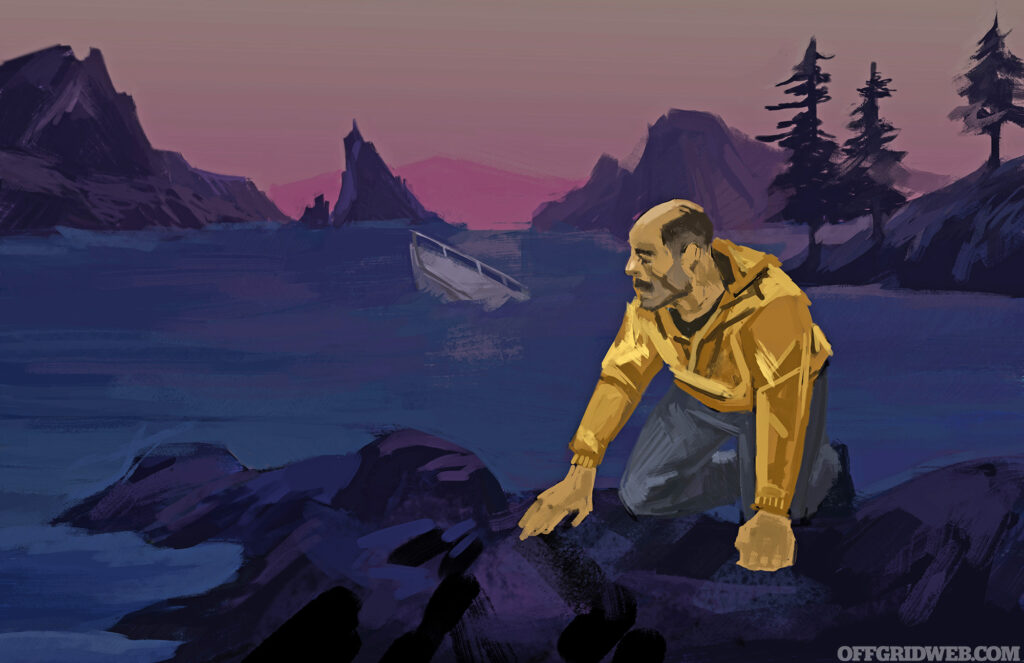
Can these symptoms be staved off with proper preparation if you’re suddenly thrust into a situation where you’re alone indefinitely due to a situation in the wilderness that left you stranded? What can one do to occupy their time to keep their brain engaged in something productive, think positively, and keep negative thoughts from creeping in and losing all hope? We asked survival instructor Kevin Estela and first responder Joey Nickischer to explain what they’d do in that situation where mind over matter is critical.
The Scenario
Situation Type
Surviving Isolation
Your Crew
Yourself
Location
Remote Pacific Northwest
Season
Spring
Weather
Cool; high 53 degrees F, low 42 degrees F
The Setup: Your own mind is one of your toughest adversaries in a survival situation, especially when there’s no one else to interact with. As has been evidenced by TV shows like Alone, one of the reasons many contestants tap out is because they can’t handle being by themselves indefinitely for long periods of time. Human beings are social creatures and need to be in contact with others to thrive. It’s clearly documented that long periods of loneliness and social isolation are linked to serious health conditions, both physical and psychological. Ask any prisoner who has spent extended amounts of time in solitary confinement, and most will tell you it was the toughest time they ever did. If you were thrust into a situation where, in addition to having to secure food, water, shelter, and heat, you were now forced to find ways to keep yourself from declining cognitively due to isolation, what would you do to keep your head about you?
The Complication: You’re an independent person and love new adventures. You have no problem going it alone on hikes, camping trips, road trips, fishing trips, and hunting excursions because you enjoy not having to rely on anyone else and the excitement that comes with a certain amount of uncertainty. However, you understand that living on the edge doesn’t come without risks. Like Aron Ralston having to amputate his arm after being trapped alone for five days under a boulder, these adventures and insistence on experiencing life to the fullest by yourself are always a roll of the dice.
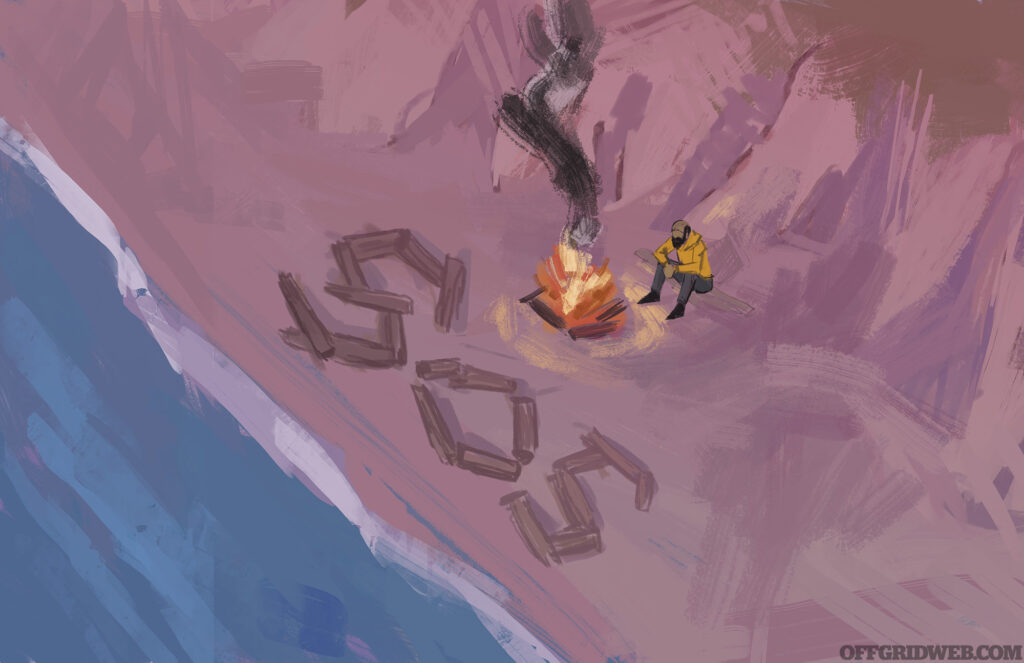
While fishing alone in the islands off the coast between the borders of British Columbia and Alaska, you decide to try a remote area you’ve never been to before. The location is about 200 feet offshore from one of the many islands in the area. As you’re bringing your 20-foot outboard boat around at a high rate of speed, you unexpectedly slam into a rock that was hidden just below the surface. Your vessel quickly begins to take on water. By the time you realize the severity of the damage and conclude the boat is sinking, there’s no time to use the onboard radio before it disappears into the water. You only have a few moments to grab what you can fit into a backpack and swim to shore.
After making the swim to shore and regaining your composure a bit, you realize the cell phone in your pocket is inoperable due to water damage. You may be stuck here a long time until help arrives. However, you feel confident your bushcraft knowledge and the few items you can salvage will help you survive off the land for a while. The problem is, how long will that while be? As this is an area not traveled by the Coast Guard often and no one knows your exact location, you realize your life is beginning to mimic Tom Hanks in Cast Away. While the closest thing to a companion he could find was a volleyball, how can you come up with activities or mental challenges to stay focused, cognizant, sane, and not succumb to the horrors of prolonged isolation?
Survival Instructor Kevin Estela’s Approach
First things first, Kev, check yourself. Do you have any injuries from getting thrown to the bow of the skiff? What about cuts to your hand you didn’t realize you received while clinging to rocks climbing out of the sound? It was really cold, and you wouldn’t even notice getting opened up by those barnacles. Prioritize! I wasn’t expecting that rock and I hate being cold and wet. I have to do something about these clothes, they’re all I have. What about all that kit left on the boat? Damn, I can’t believe I don’t have that other gear. Snap out of it! Being cold and wet is a choice at this point and I can fix that if I get a fire going, or I can bitch and moan about something I should fix later on. There has to be driftwood washed up on shore. Even if the outside of that wood is wet, I can shave it down and get to drier wood inside. I still have my Winkler fixed blade, so here we go.
Preparation: Without injury, it shouldn’t be difficult to get a fire going. I’ve been teaching bushcraft and survival skills since 2007 and have lit thousands of fires. I’m carrying a ferro rod that can survive brief exposure to saltwater but this salty environment will eventually wear it down and destroy it. I have a carbon-steel fixed-blade belt knife that I don’t have to worry about opening — thank God, since my fingers feel frozen. If I keep moving, I can warm my body from the outside in. I see plenty of driftwood; it’s willow and it burns like crazy. I’m going to need a lot because it burns hot but fast, and I’ll be through my short supply quickly. One armful, and then another, and more and more. Don’t worry about the quality of each piece — surely there are going to be some duds in there along with the prime dried-out pieces.
Screw building a fire ring like all the manuals; there’s no chance that fire is going to spread in this damp environment. Start with the tinder — lots of tinder — and use the back of your blade to make fine scrapings that’ll take a spark. Pin those scrapings down and run that ferro rod hard with a lot of quick scrapes instead of your usual one or two scrapes with concentrated sparks. You need as much heat as possible, and you can be critical of your technique after you get fire. A spark, then a slow glow of flame that builds intensity as it hits more fuel, then FIRE! Thank God. Now maintain it, add fuel, dry your clothes, and assess your kit. Plan on banking your fire overnight and keeping that warmth going indefinitely.
The fire is warm, and it’s giving me some comfort. This would be a lot easier if I could clone myself and have an extra set of hands, but I’m all alone here. I’m being negative again. I can’t think about others, I need to be “survival selfish” and think just about me right now. Looking through my backpack, I have the usual gear on me like a water bottle with a nesting cup, some repair kit, battery charger for my now non-working phone, some fishing tackle, a few creature comfort items like a headlamp, gloves, and some basic med gear.
What else is out there on the boat? If I wait six hours, the tide will be low and I can wade out there to check, but I need to do this now before the weather and time takes its toll on me. I can build up my fire and be ready to walk back to shore. I know there is a basic flare kit, a bait bucket I can use to collect rainwater, and a dedicated fishing pole. What was that quote I’ve used about coastal foraging? That’s right, “When the tide goes out, the table is set.” There’s plenty to eat here. I just have to make sure I stay warm and hydrated. The physical side of this emergency shouldn’t be the worst I’ve been through. I know my mind is going to wander, and given this remote location, I have no idea when I’ll get out of here. I have to keep my mind busy or thoughts I have no control over are going to get the best of me.
On Site: With the basic kit I recovered from the boat and a system of feeding myself that follows the rise and fall of the tide, I’ve settled into a routine, which is absolutely vital. I’m working on my primitive shelter each day. The bed I’ve made using a garbage bag on top of ferns needs daily upkeep as my body weight crushes them down nightly. Once repaired, I wait for the tide to go out and collect mussels, snails, and assorted shellfish. Every so often, I’ll find a small fish trapped in the tide pools that I can shock by throwing a rock into it and then splashing the stunned fish out onto the rocks.
The pile of discarded shells is helping to fool my brain that I’m eating enough, but I know my body is craving not just calories but diversity. Food boredom is kicking in. Each day, I’m building up the materials I have set aside for a smokey fire I’ll light if I see any ship or bush plane fly by. This environment is so lush and green, the white smoke from burning greens should contrast and stand out, but it has to be a significant amount of smoke or it could be confused for a poorly lit camping fire. This routine is getting boring, and I need to do something else to defeat this isolation.
As a kid, I stacked rocks along the Connecticut shoreline and threw others at them to knock down the towers. My dad was a crack shot and every so often, we’d throw a larger rock and find a spurt of water come out of the ground where a clam was. Wait! I forgot about that until just now — I can dig up clams with a digging stick I’ll carve. It will become a game, a goal, and each day I’ll reward myself with the bounty. It’s a little victory, and I need that right now. Not seeing any sign of rescue each day is weighing on me, and I have to build some positive mental attitude little by little.
I’m trying not to imagine what my family and friends are thinking about me. I never checked back in during the comms window we established. They must be worried, and they must be looking. I hate inconveniencing them. Snap out of it, Kev. It will be worse if they never find you or find a dead body here. You can’t worry about them now. Be survival selfish and survive. These tears are a sign I’m losing it. Wipe them away. Dad wouldn’t want you to be weak. Remember the family motto, “To the last drop.” You don’t give up, you don’t quit, and don’t you consider suicide. That doesn’t end pain, it transfers it. You keep going. Remember what you have to go home to. Remember that girl in Texas you met who you still want to build a relationship with. Remember that next book you want to write. There’s more positive to look forward to at home than there is negative here on this island to crush you. Don’t forget your worth and your potential.
Crisis: This morning, I noticed I’m losing more and more weight and muscle mass. That line that formed on my Tenicor Zero belt from regular wear is not where it is now. My seafood diet is starting to become more transactional, and I’m just choking food down now for the sake of calories. Gone is the gratitude before each meal, and I feel like I’m barely existing. I can’t lose all faith, and I have to continue to pray something will change here. This feels like a test, and I feel like I’m on the verge of failing. My ferro rod has long been worn down by the environment and regular use at night as a quick light, since my headlamp has been useless for a couple weeks now. I can’t stand the fact I walk by salmonberries that aren’t ripe yet and feel like they’re taunting me. I’d kill for something sweet like they usually are in the summer, but that is still months away. I can’t believe a stupid segmented/aggregate berry is pissing me off.
Each day, I walk the shoreline of the small island hoping to find something that washed up that could help me. Every day, my expectations for rescue seem to dwindle. I’m convinced I’m the only jerk who has ever been around to this cove. I’m making it a point to add more tasks to my day each day, but there are only so many times I can hone my knife on the smooth rocks on the shoreline and only so many times I can make extra thin cordage out of the scrap dock line that was washed up. There are only so many times I can wake to the sound of something in the woods behind me only to realize it isn’t another human but some four-legged scavenger. I’m normally an optimistic person, but the gravity of my reality is crushing me.
Something hit me today. I’ve made a living out of teaching bushcraft, and this has been a test of those skills and that knowledge. My final days here mean nothing if I’m never found. Or maybe I am found, but it is too late and all that remains is the skeleton of a man curled in the fetal position, representing one final attempt to stay warm with no good firewood nearby. A new daily practice as part of my routine has been to sit on a particular rock that looks out over the sound just looking at my watch and seeing how slow time is passing by. The sound. No … wait, that sound! It’s one I know. It’s the sound of a fishing reel’s drag being tested. I look to my left to see a sport fishing charter that must be going for lingcod or another bottomfish. Have I been out long enough that a new fishing season has started? It doesn’t matter. I need to light this fire, I need to grab those flares, I have to be as obnoxious as possible to get their attention. I’ve been so survival selfish thinking about my own daily fishing that I’ve forgotten others would be drawn to this area. It looks like that charter boat is changing position. Are they repositioning for another drift or are they headed my way? How many weeks has it been since I drifted those waters? They aren’t following that line that I used, the bow is turned in my direction and they’re sounding their horn.
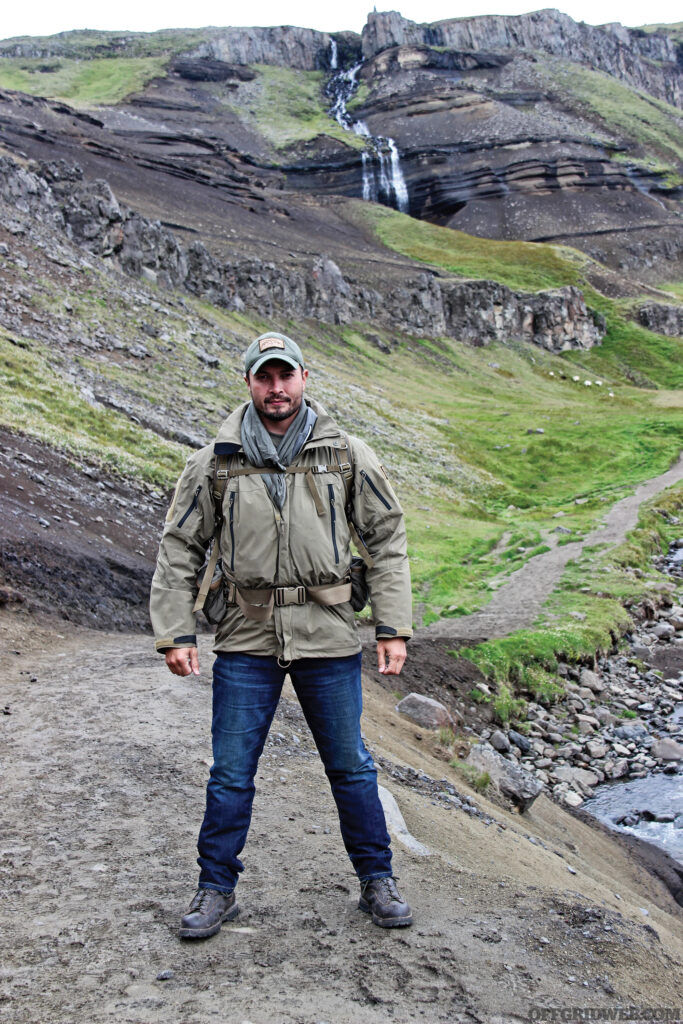
Above: Survival instructor Kevin Estela stands geared up and ready for whatever the path ahead may throw at him.
First Responder Joey Nickischer’s Approach
There are scores of stories of people getting stuck on a deserted island for the long haul, and an untold number who were trapped for a day or more. As part of your regular prepping repertoire, it’s wise to take precautions against this happening if you’re traveling over or through the water. While most people will automatically think they need supplies to ensure water, shelter, and food, the biggest thing many people forget is to prepare for the mental struggle that’ll inevitably set in.
My first few days marooned on an island will be focused on the immediate needs of getting warm, building shelter, collecting water, and signaling for help — all of which are the hallmarks of every good outdoorsman. After all, I’m usually the one out looking for lost people and have the skill set to handle this situation.
Get started! Take off the wet clothes as water will pull heat away from the body 25 times faster than air. A few light exercises will start the heart pumping and get my core body temperature up. Now, look for a good spot to start a fire, one that will warm me, provide rescue signal in both smoke and light, keep critters away, and boost my spirit. Take a full inventory of what supplies you were able to salvage from the boat. My Ten Essentials list was outlined in “Get Lost” in RECOIL OFFGRID Issue 28 and contains, among other things, fire-starting material, a flashlight, orienteering compass, small tarp, whistle, and the old-school USAF survival knife. This kit will get me through the first few days, and if I’m lucky, I was also able to grab a flare gun and life jacket.
Next, think about shelter for the night, both underneath you and above you. It’s also important to make a large SOS signal in an open area that’s very visible from the air. We’re not talking letters 3-feet tall; we’re talking letters 10- to 20-feet tall. The bigger they are, the farther away they’re recognizable. Tomorrow, explore the island for possible inhabitants and threats.
Once the first few days have passed, this is the time that the first bit of real fear will start to creep into everybody’s consciousness. What if help never comes? This notion shouldn’t be too hard to dispel in the early stages. Stay focused, and don’t let your fire burn out. Starting a fire is a lot more labor intensive than keeping it going; it also lifts your spirits. Make sure to have a slow but steady supply of combustible material handy, as well as some greener material to make a lot of smoke. Smoke is visible from miles away. Make sure your SOS sign still has good contrast to the background; green materials will start to fade and footprints in the sand will also diminish. Refresh these regularly. It’s also time to start working on a viable food source. Fish should be an easy choice but also forage for what the land has to offer. I’m going to stay busy and focus on what I need to do. Surely somebody is looking for me and in the right area. After all, I did remember to leave a detailed itinerary with a trusted friend.
As the days turn into weeks, and the weeks turn into months, this is where the mental problems really start. According to Dr. Sharon Shalev, author of A Sourcebook on Solitary Confinement, we’re going to start feeling anxiety, depression, anger, panic attacks, hypersensitivity to sounds and smells, concentration and memory problems, fatigue, hallucination, and paranoia. The best way to combat these mental health challenges is to nip them in the bud, preferably before they start; loneliness is a big deal. If you watch Cast Away with Tom Hanks, the movie script delves into his struggles with this. Hanks’ character, Tom Nolan, even draws a picture of his girlfriend onto a cave wall as a coping mechanism. And, of course, the unsung hero of the movie was Wilson, the blood-stained volleyball with a face drawn on it. Wilson was Nolan’s connection to the living world and was inspiring enough to keep him from committing suicide.
The Will Smith movie I Am Legend also touches on the struggle of isolationism. In this movie, we see Smith’s character, LTC Robert Neville, using many of the coping mechanisms I touch on below. The writers did a good job portraying the dark path the mind can wander down when inherently social humans are forced into solitary existence. (I particularly like this movie not just for the interesting storyline but because I have a 2.3-second appearance in it, by the Brooklyn Bridge.)
If you’re ever in the solitary survival situation, you want to end up a lot more like Nolan and a lot less like the Unabomber, Ted Kaczynski. Here are some of the things you can try to ease these stressors:
Focus on the present. Don’t trouble yourself worrying about next week when you’re overly stressed — deal with the here and now. Do things to, ever so slightly, improve your situation. Small steps and small victories.
Structure your day. Having a routine is comforting to many people. You don’t have to think about what comes next; you already know the schedule. Tend to the fire, get some water, eat some food, upgrade the shelter, back to the fire. Rinse and repeat.
Positive self-talk. What a powerful thing positive self-talk is. When I was a young police officer in the early 1990s, I attended the Calibre Press Street Survival seminar. There were many positive things I took away from that seminar but one of the most powerful was the Positive Self Talk card. I carried that card in my wallet until well after I retired. Some of the things written on that card were, “I will learn from my mistakes and the mistakes of others,” “I will adapt, improvise, and overcome any adversary,” “I will be committed to maintaining balance and emotional health,” and my favorite, “I will survive.” I read and reread these mantras numerous times in my career. Sometimes I didn’t even need to read them, just seeing the card in my wallet was enough for me to remember the ones I needed. To me, the biggest part of the officer’s creed is “I won’t give up and I will make it.” You bet your ass I won’t give up — and neither should you.
Be optimistic. If you’re feeling down, give yourself some positive self-talk and then think about the amazing, best-selling book you’re going to write about your misadventure. Change your perspective.
Stay active. Don’t spend your day lying around and loathing your situation; that isn’t going to help anything. Instead, spend the day doing things that make you happy or improve your situation. Take a walk along the shoreline and as Nolan said, “Who knows what the tide will bring.”
Practice some new skills. Think of this as the perfect opportunity to try and build that survival shelter you said you always wanted to make — there’s no better time than the present. And didn’t you always want to learn to build a fishing net? A fishing net sure could make life a lot easier, maybe it’s time to get started on that. Oh, and a basket would be great to put all that fish in — let’s weave a basket. A solar still can come in handy — let’s see if I can make one. Or perhaps I can turn that rusty tin can I found on the beach into a mini stove.
Attitude of gratitude. Be thankful for every teeny, tiny thing you can. It’s a bright sunny day? Excellent, it’s a good time to absorb some vitamin D from the sun. It’s raining? Quick, let’s catch as much as we can to increase our water storage. Whatever it is, think of it in the most positive way.
Smile. This goes along with the attitude of gratitude. According to the National Alliance on Mental Illness, your brain builds neuron connections in just 12 seconds. Neurons are the information messengers between different areas of the brain. In short, they help brain function and could use a little extra exercise. Stop, close your eyes, smile big, and think of something positive for just 12 seconds.
Nutrition. Nutrition plays a big part in our overall well-being. Do your best to eat whatever you can scrounge up. And once in a while, maybe give yourself a reward with a small feast. Gather up a big pile of fish, clams, mussels and berries — or whatever you have available – and pretend you’re at a family picnic. Eat up.
Write about your situation. After all, you want to have most of the details remembered when you publish that best-selling book — like Aron Ralston did after he was forced to amputate his own arm after it got trapped under a boulder. Strips of bark can be removed from trees and a charcoal pencil can be made from burnt sticks. You can combine the writing with practicing your new skills for paper making as you discover which bark has the best consistency for writing and longevity. Hint, it’s birch bark.
Play games. Make a game of anything you do. Challenge yourself to do something better or faster. Make yourself a deck of cards out of rocks. Gather some gray, brown, black and white stone to count as the different suits and scratch appropriate markings onto them; solitaire is a one-person game. Or shoot some hoops using a pine cone and one of those baskets you wove. The crashing waves can be the adulation of the fans in the audience as you drive down the court and slam dunk the ball.
Music. Two University of Central Florida professors teach a class called “Music and the Brain,” explaining how music impacts brain function and human behavior — including by reducing stress, pain, and symptoms of depression as well as improving cognitive and motor skills — and the brain’s ability to produce neurons. The brain reacts emotionally to music and can bring you joy, excitement, and pleasure. Have your own private karaoke session — nobody is going to complain this time. Or drum on some logs and rocks. This is also a good time to perfect your whistling ability.
Look after something else. Nolan invented Wilson to keep him company, and it was also Nolan’s responsibility to look out for Wilson. You might recall near the end of the movie, Nolan was napping on the raft in the middle of the sea, exhausted. He awoke to find that Wilson had started to float away, and it was Nolan’s duty to “save” Wilson. So, adopt something. Keeping the fire alive could be that thing, plus it’s useful. Or perhaps you might find a turtle that wants a buddy. Whatever it is, it’ll help give you purpose.
A positive mental attitude is the backbone of survival. Do everything you can to stay as upbeat and positive as possible. Once you start practicing a positive mental attitude, it’ll carry over into all areas of your life. As Nolan famously said, “I know what I have to do now. I have to keep breathing because tomorrow the sun will rise. Who knows what the tide will bring.”
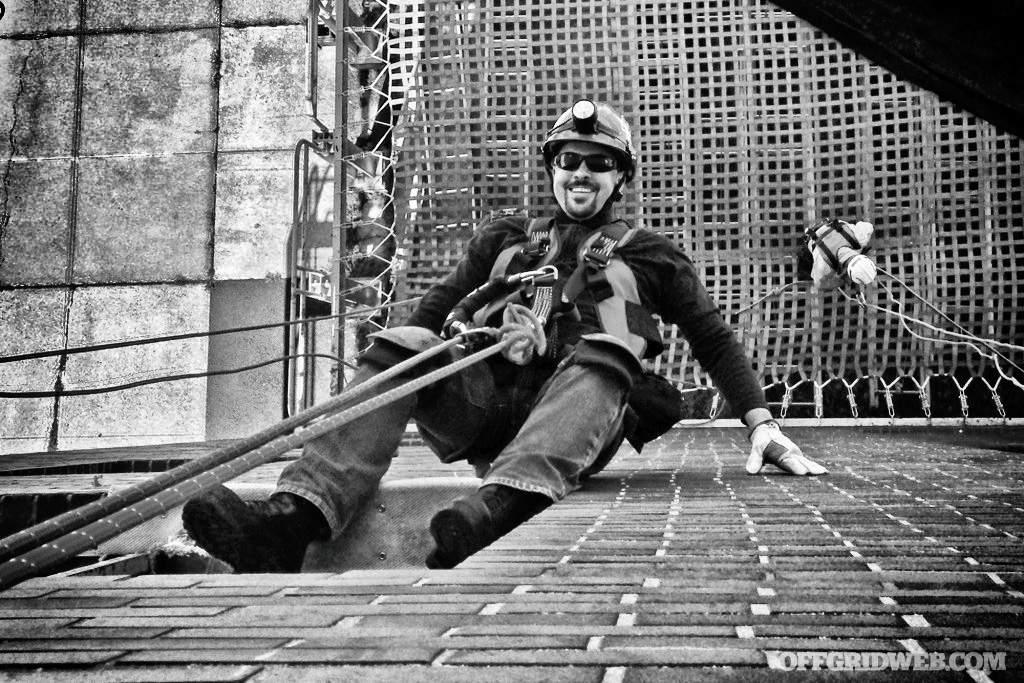
Above: Retired NYPD detective and technical rescue instructor Joey Nickischer hones his technical rope skills.
Conclusion
It’s easy to succumb to the fear of tangible disasters, such as an assault, natural disaster, or viral pandemic. However, as Dr. Neal Olshan pointed out in “Don’t Be Afraid of Fear,” in RECOIL OFFGRID Issue 11, letting fear run rampant has severe consequences on its own. Being alone and having to survive by yourself in the elements comes with its own set of challenges, especially when no one is there to help or communicate with. Letting feelings of isolation get a foothold can only exacerbate the problem, particularly if you don’t even realize it’s starting to manifest.
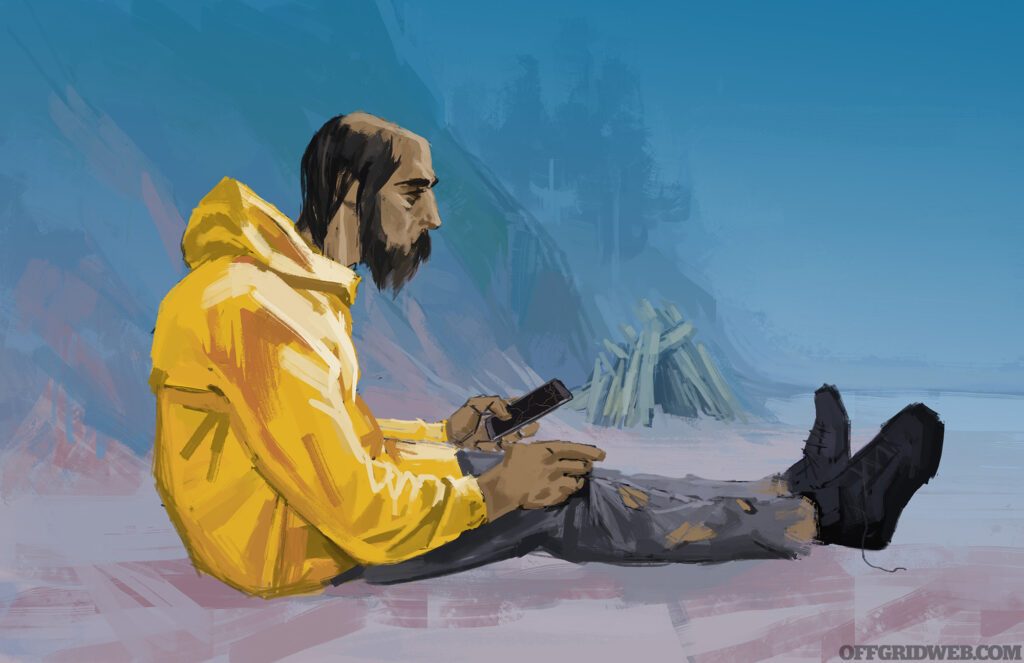
Read up on research to learn some interesting facts about what leads to feelings of social isolation and how that differs from loneliness. It’ll help you gain a greater understanding of the markers that can happen so you can recognize it if you have negative emotions associated with being alone. If it can occur when you’re surrounded by other people, imagine what can happen when you’re forced to be by yourself. Challenge your brain with mental exercises, games, and documentation of your thoughts when you start to experience those feelings. The negativity you feel often has nothing to do with your surroundings but is a distorted message emanating from your own mind. Correcting that with certain activities and psychological assistance in the best possible environment you can when resources are available will help you prepare that much more for being in an atmosphere that is stripped of human interaction.
Meet Our Panel

Kevin Estela
Kevin Estela is a Director of Training for Fieldcraft Survival and the best-selling author of 101 Skills You Need to Survive in the Woods. A lifelong bushcrafter and sportsman, Estela has traveled to many countries to hunt, fish, and trek. He has been featured on many popular podcasts and has been in numerous magazine features. Estela has designed many products for the outdoor and everyday carry market, and he works closely with many companies to develop highly functional and respected gear. He currently resides in Moore County, North Carolina. www.fieldcraftsurvival.com
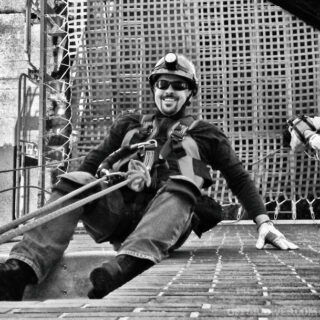
Joey Nickischer
Joey Nickischer is a retired detective with the New York City Police Department. He currently works as a lead technical rescue instructor with several different companies covering topics from wilderness search, high angle rope, mine rescue, and off-road operations. He serves as a team leader with the Westchester County Technical Rescue Team and is the commander of the Putnam County Technical Rescue Team, as well as serving as chief of department with the Patterson Fire Department.
Related Posts

Survival Medicine Suggestions: Stockpiling, Using and Maintaining a Medicine CabinetDisclaimer: This is a general overview and not a detailed list on medications to be stockpiled for an emergency. Consult your physician about personal recommendations that may vary due to […]
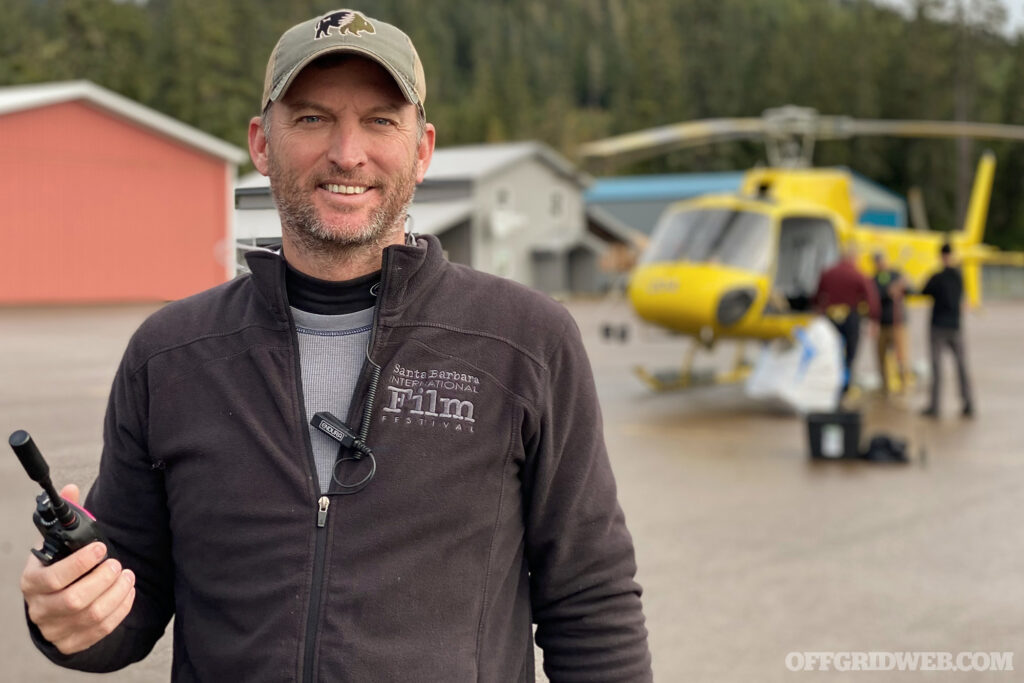
The Making of Outlast: Our Q&A with the Executive ProducerWe spoke with series Executive Producer Grant Kahler regarding the filming of Netflix Outlast and what it takes to survive the wilderness.
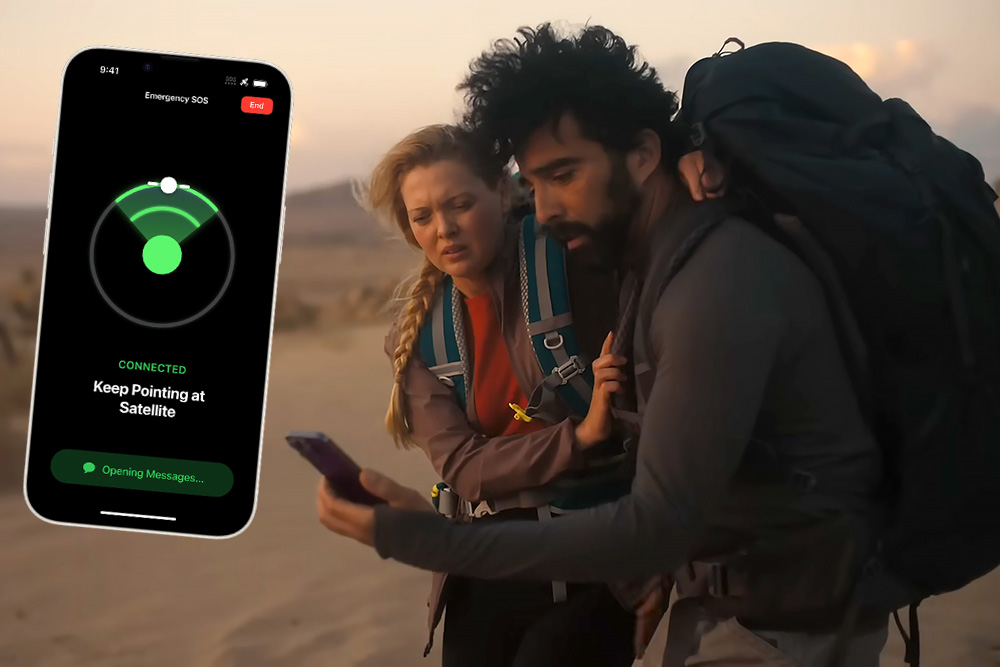
iPhone 14 Adds Satellite SOS and Crash Detection FeaturesThis week, Apple announced some new emergency preparedness capabilities for the iPhone 14: automatic car crash detection and satellite SOS.

New: Bushnell BackTrack Mini GPS UnitThe new Bushnell BackTrack Mini GPS unit offers navigation, weather tracking, and Bluetooth connectivity at an affordable price point.
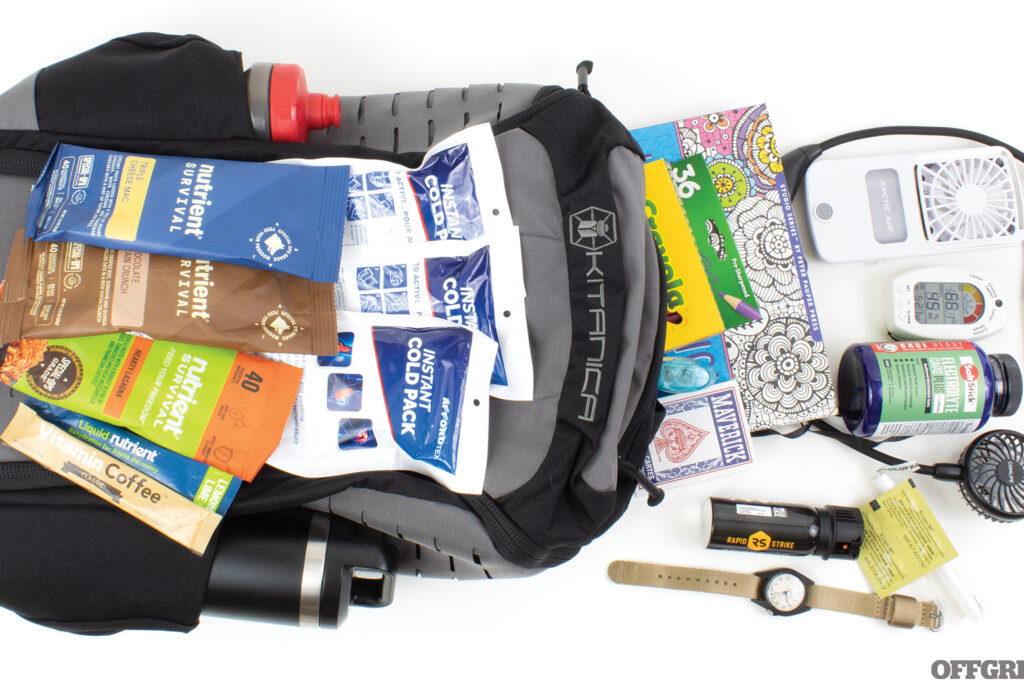
Bag Drop: A Heated SituationA look at a discreet backpack configured for surviving unexpected blackouts during extreme hot-weather conditions.
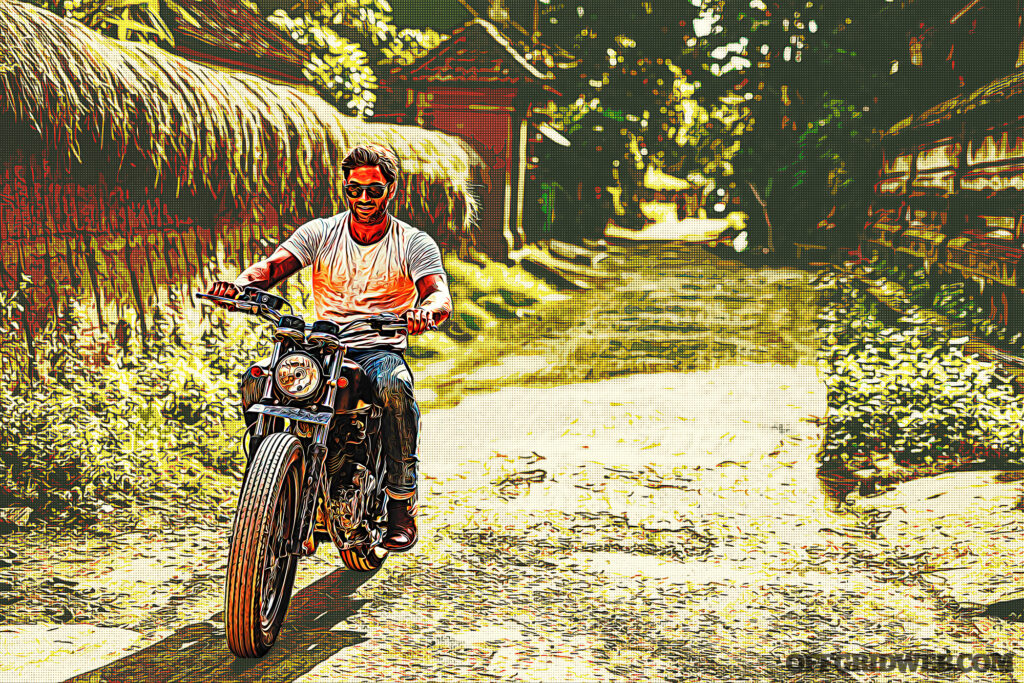
What If You Escaped from a Kidnapping?If you’re alone in a country widely known to have rampant kidnappings, do you have a plan on what to do if you manage to escape captivity?
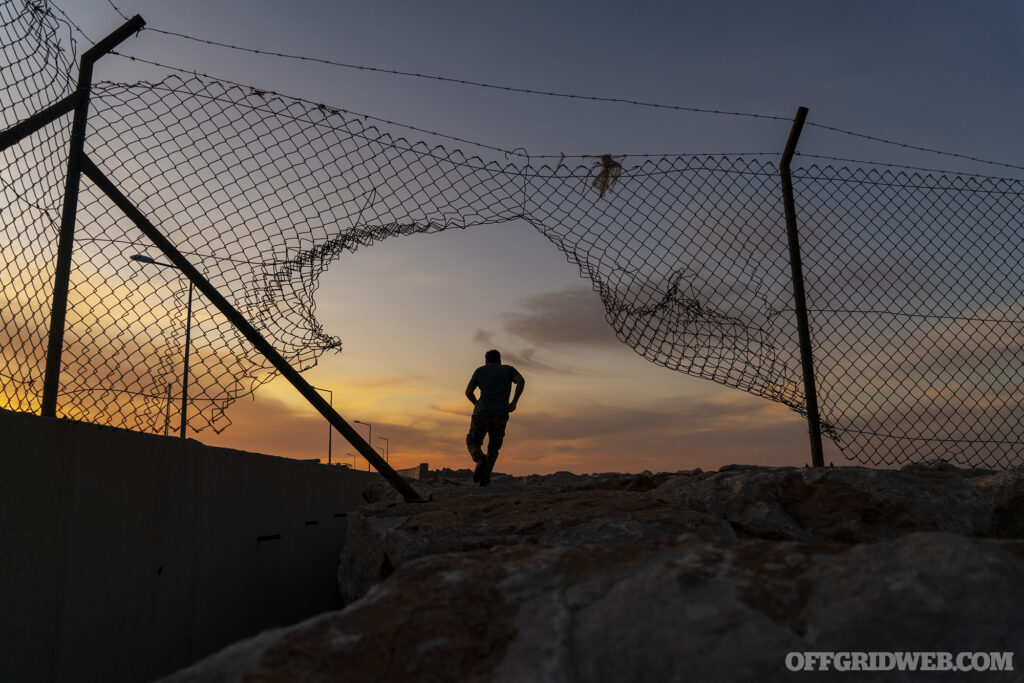
Letter from the Editor: All Restraints Are Temporary…We’ve decided to take this issue to examine how to evade danger — whether it’s before or after you’ve been actively held hostage.
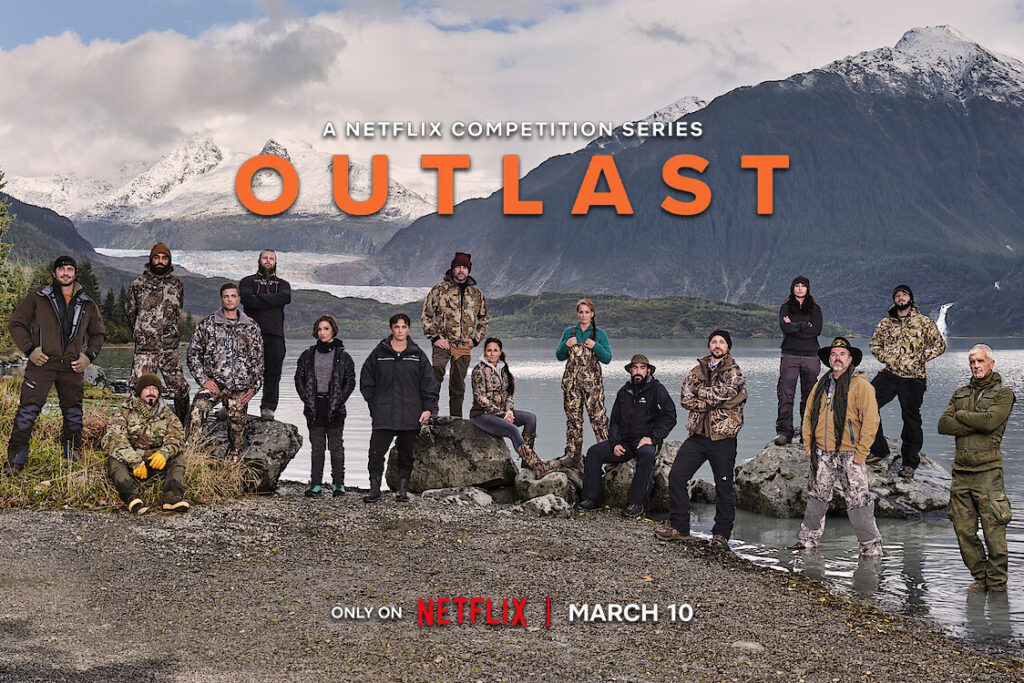
Outlast on Netflix: New TV Show Blends “Alone” with “Lord of the Flies”A new Netflix series called Outlast splits 16 contestants into teams to see who can survive longest and claim a million-dollar cash prize.
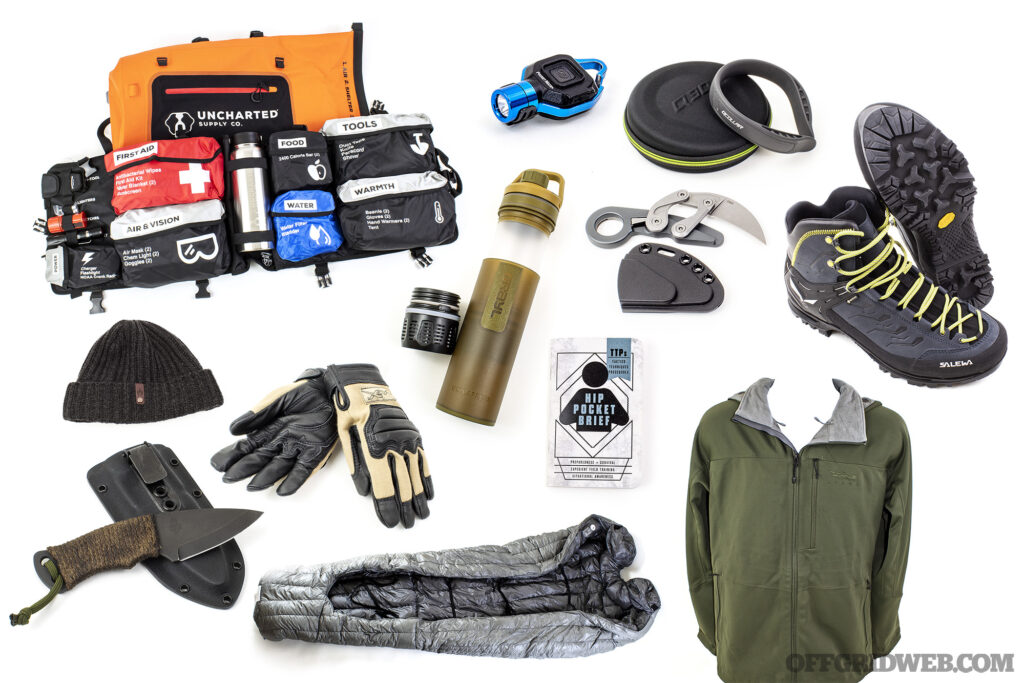
Gear Up: New Survival Gear for February 2023We take a look at some of the latest survival gear from CRKT, Grayl, Streamlight, Wiley X, Salewa, Sitka, Corvus Survival, and more.
The post What If You’re Isolated for an Indefinite Amount of Time? appeared first on RECOIL OFFGRID.
By: Offgrid Staff
Title: What If You’re Isolated for an Indefinite Amount of Time?
Sourced From: www.offgridweb.com/survival/what-if-youre-isolated-for-an-indefinite-amount-of-time/
Published Date: Fri, 12 May 2023 21:19:32 +0000
-------------------------------------------------------------------------
Did you miss our previous article...
https://outdoorsnewswire.com/survivalist/best-papr-powered-air-purifying-respirator
 CampingSurvivalistHuntingFishingExploringHikingPrivacy PolicyTerms And Conditions
CampingSurvivalistHuntingFishingExploringHikingPrivacy PolicyTerms And Conditions
